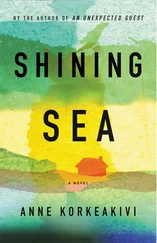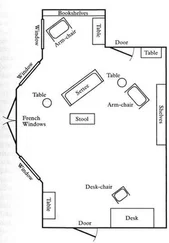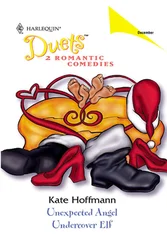Not to be considered.
Either way, she’d have to search out the correct police station and go in to make a statement. That would mean, at the very least, abandoning her hair appointment, but God knows what else also, because how long might it take? French bureaucracy wasn’t exactly known for its efficiency, and this was the murder of a high-ranking French official. She could be down there for hours. She and Edward might even have to cancel the dinner.
Impossible.
If she was right, however, and her Turk was innocent…
She could single-handedly keep the police from following the wrong lead, and get them on track to searching for the real killer. She could be pivotal in catching the murderer. And she could be pivotal in sparing her Turk unnecessary harassment.
Unless…
Maybe they’d still hunt him down, even with her statement. There was an eyewitness. He was believed to have belonged to that organization. Why would they instantly believe her word about it?
So, it would become her word against that of the other witness.
Again, the police might have to start delving into her own history.
That was not going to happen.
She would wait. Meanwhile, tonight’s dinner would go on.
She pulled her sweater sleeve over her watch and, selecting a fine-tipped blue ballpoint pen, copied down the pertinent information from Jean-Benoît’s receipt in the ledger, immediately under the entry she had already made for the cheese and asparagus.
After she’d transcribed the amounts, she reviewed her work carefully. She did this, as she always did, because — just as she hadn’t immediately put together the time problem between when she’d last seen the wrestler and the reported time of the murder — numbers were the one weakness she couldn’t seem to shake. “Clare can’t remember our phone number,” one of her brothers had ratted her out to their mother when she was still in grade school, and she’d had to write the number on her thigh in ink before they’d sat down to that night’s dinner, slipping her skirt up high under the table to read it so as to prove him wrong. Even as she’d excelled in all her other courses, math class had always been a struggle. As she’d gotten older, she’d learned ways for coping with the problem without ever managing to overcome it. She’d devised elaborate tricks for memorizing her own cell phone number, and all the others she called regularly she had relegated to rapid-dial. “Don’t fuss too much over it. Everyone has to have some little foible and at least yours isn’t biting your nails or drink or betting on the horses,” Edward had said a couple years back when she’d stumbled upon an article about mathematical dyslexia. But she disliked having any perceivable weakness, and she continued to triple-verify any number she touched, including those on the Residence’s expense ledger.
She found one mistake. She searched in the desk drawer for white-out, blotted over the incorrect digit, waited a moment for the white-out to dry, and wrote in the correct figure. When she was sure the page was dry, she closed the book and replaced the ledger in her drawer.
His face was still staring at her from the computer. She might occasionally make mistakes with numbers, but she had not made a mistake about the time she’d met him.
She checked her watch yet again. The car she’d ordered to take her to the hairdresser’s would be waiting downstairs. There would be other cars blocked behind hers in the single-lane street, honking. Maybe one of the guards or a gendarme would approach the driver to complain. She looked at the phone but did not touch it again. She capped the pen she’d been using and placed it back in the desk’s pencil holder. She clicked off the Internet, the wrestler’s face popping out of sight at her touch. She rose. She withdrew her scarf from the back of the chair and wrapped it around her shoulders. Tonight’s dinner was fast approaching, and a distracted wife with unkempt hair was not the ideal spouse for a future ambassador to Ireland.

Clare could see her hairdresser, Marco, inside the salon, adjusting a square of foil in the hair of a seated customer. The woman looked like a project Peter had done for science class while he was still in elementary school, a doll robot with rolls of tinfoil encircling its head. Like the woman, the robot had borne a brightly painted smile.
Behind her, Clare felt the weight of her driver’s gaze. She was grateful embassy drivers considered themselves quasi-bodyguards, but his present concern made her feel as though she were a bug squashed between two glass slides under a microscope. There he was, waiting behind her, and there Marco was, waiting before her. She stopped in the middle of the sidewalk and waved to the driver that he should leave. But she couldn’t bring herself to go into the hairdresser’s salon.
She pulled her cell phone out of her bag and, in her mind, rehearsed what she might say.
“I’m really sorry to bother you again, darling, but I have a quick legal question. If you were wanted by the police for a crime, here in France, but someone came forward who could provide an alibi for you, would the police stop hunting for you? Before you’d been caught and questioned? Would it change the investigation? And could that person offer the alibi, say, over the phone?”
She didn’t unlock her phone. Edward would think she was nuts interrupting him, today of all days, to ask something like that. What explanation could she possibly come up with that he wouldn’t see through? Especially when she got to the next part.
“And how about if there was a second witness, who claimed to have seen you commit the crime? Would they check into the backgrounds of both witnesses? Would it become a question of seeing which was more credible?”
A trail of smoke, the remnant of a passerby’s cigarette, curled up into her face. The cigarette had been hand-rolled, of the sort she had smelled on her Turk’s jacket. When they were walking down the boulevard side by side, she’d contemplated how foolish he was to smoke, considering his medical problems. Good grief! She’d been worrying about his nicotine habits. They’d both had much bigger worries ahead of them. If she went to the police, at the very least there would be statements, and officials, and documents, and the press, and lots and lots of talk. Back when she first met Edward, she’d felt fear at the very sight of a policeman. She’d crossed streets not to pass in front of them; she’d turned her face so there was no chance they would see and recognize it from a description or drawing. In twenty years, she’d managed never even to be stopped for a traffic violation. She could smile at the gendarmes on her street, without a hint of hesitation, and wait for them to nod their hats back at her. She’d cleared her slate. She’d washed away the traces of her iniquity.
Clare flicked the smoke out of her face with as subtle a twist of her hand as possible and glanced at the salon window. Marco was very specifically now avoiding looking in her direction. She was late for her appointment, and still she was on the street, standing there dumbly, cell phone in hand, acting like a confused puppy. She tucked the phone back into her purse, and tried to tamp down her thoughts in the same neat fashion.
If the police managed to apprehend her Turk — which was in itself unlikely — she would step forward, if she had to. But she probably would never have to because the doctor he’d gone to see would be able to identify him just as well as she could. In fact, the doctor had probably already come forward to identify him. Or would this evening, once he turned on the evening news and saw the picture. Or would tomorrow morning, after he’d seen the morning paper. If no doctor ever came forward, that could only mean there was no doctor. That, in turn, would mean the Turk had lied to her — proof he was mixed up in this whole thing after all. How, she didn’t know, because the time conflict was undeniable. Either way, there was no need for her to get involved with the whole mess, and certainly not today.
Читать дальше













